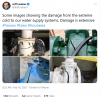Texas mayor resigns after telling freezing residents to stop complaining about cold snap
David K. Li and Matteo Moschella and Donna Mendell
Wed, February 17, 2021, 12:57 PM
The mayor of a small west Texas town has resigned after lashing out at constituents who have been paralyzed by this week's devastating cold snap.
Colorado City Manager David Hoover told NBC News that Mayor Tim Boyd stepped down on Tuesday, but the administrator declined further comment.
In a
widely-circulated Facebook post that has outraged many, Boyd told town residents to stop complaining about the cold weather that has
left millions across Texas stranded without power.
"No one owes you or your family anything; nor is it the local government's responsibility to support you during trying times like this! Sink or swim, it’s your choice!" Boyd wrote in the post on his Facebook page, which was later copied on the
Mitchell County Issues community forum.
"The City and County, along with power providers or any other service owes you NOTHING! I’m sick and tired of people looking for a d--- handout!"
He went on to write that anyone complaining about the cold must be lazy and products of bad parenting.
"If you don’t have electricity you step up and come up with a game plan to keep your family warm and safe. If you have no water you deal with out and think outside of the box to survive and supply water to your family," Boyd continued. "If you were sitting at home in the cold because you have no power and are sitting there waiting for someone to come rescue you because your lazy is direct result of your raising."
Colorado City is about 80 miles outside of Midland and is home to
nearly 3,900 residents.
Jody Beavers, administrator of the Mitchell County Issues page, said Boyd meant well but should have taken a different approach.
"He’s a good guy, I just think he got frustrated with the situation," said Beavers, a 43-year-old oil field operator and lifelong Colorado City resident.
For several days, town residents had been asking for the city to consider opening public buildings, if the power were on inside, so they could take advantage of the heat, according to Beavers.
"I think he took it the wrong way, he took it as them wanting him to buy them hotel rooms," said Beavers, who got his electricity back at 3 a.m. Wednesday after 58 hours of darkness. "That's not what they were wanting. They just wanted somewhere to warm up."
Boyd appeared to delete his Facebook page and he could not be immediately reached for comment on Wednesday.
YEE HAW







